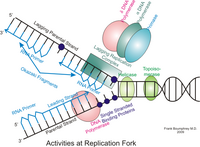Eukaryotic DNA replication

Eukaryotic DNA replication is the process by which cells in your body make more DNA, the special molecule that carries all the important instructions needed for life.
Think of DNA as a big instruction manual, like the ones grown-ups use to put together furniture or play with new toys. When a cell wants to make more copies of itself, it needs to make sure that each new cell has a copy of the instruction manual, so that they can do all the same things that the parent cell could.
So, how does a cell make more DNA? Well, it's kind of like making a photocopy of a really important piece of paper. The cell starts by "unzipping" the DNA molecule down the middle, so that each of the two strands is separated. Then, special proteins called DNA polymerases come in and read one strand of DNA like a template, and they use that template to make a new copy of the other strand.
It's like if you were trying to copy a drawing from one piece of paper onto another. You might trace the lines from the original, and then use that tracing to create a new, identical copy on the new piece of paper.
Once the DNA has been copied, the cell puts the two new strands back together again, forming a complete double helix. And just like that, the cell has made a duplicate set of instructions that it can use to create new cells, repair damage, and carry out all the other important tasks that keep you healthy and happy!
Think of DNA as a big instruction manual, like the ones grown-ups use to put together furniture or play with new toys. When a cell wants to make more copies of itself, it needs to make sure that each new cell has a copy of the instruction manual, so that they can do all the same things that the parent cell could.
So, how does a cell make more DNA? Well, it's kind of like making a photocopy of a really important piece of paper. The cell starts by "unzipping" the DNA molecule down the middle, so that each of the two strands is separated. Then, special proteins called DNA polymerases come in and read one strand of DNA like a template, and they use that template to make a new copy of the other strand.
It's like if you were trying to copy a drawing from one piece of paper onto another. You might trace the lines from the original, and then use that tracing to create a new, identical copy on the new piece of paper.
Once the DNA has been copied, the cell puts the two new strands back together again, forming a complete double helix. And just like that, the cell has made a duplicate set of instructions that it can use to create new cells, repair damage, and carry out all the other important tasks that keep you healthy and happy!
Related topics others have asked about:
